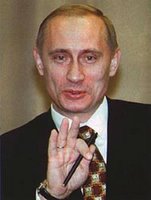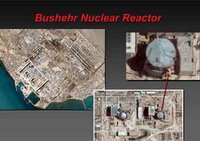 Has Putin - Time Magazine Man of the Year 2007 - been dethroned? Has virile Volodya finally lost his powerful sex appeal and magic with the ladies? So it would seem, judging from a recent toplist of the sexiest politicians in Russia, made by Russian Sex & the City magazine. Moreover, Putin was beaten by a has-been liberal politician, vegetating on the sidelines of Russia's weak and squeamish democratic opposition.
Has Putin - Time Magazine Man of the Year 2007 - been dethroned? Has virile Volodya finally lost his powerful sex appeal and magic with the ladies? So it would seem, judging from a recent toplist of the sexiest politicians in Russia, made by Russian Sex & the City magazine. Moreover, Putin was beaten by a has-been liberal politician, vegetating on the sidelines of Russia's weak and squeamish democratic opposition.So, is this really the time for such jibberish and nonsense as the power and sex pendulum, when the world is set ablaze and sales of books declaring "The New Cold War" soar to become bestsellers overnight? Actually, it obviously is, because it tells a lot of how primitive our emotions may be when confronted with realities we do not want to face - and in some cases have spent years running away from.
Why is it that an article in a rather obscure Russian ladies' magazine - with a blog rather than a website fronting its business - gets such attention by international media at this very point in time? Good journalism? A story with potential Pullitzer prize qualities? I think not...
The simple reason is probably the psychological need for negative power projection - a primitive urge to make Putin look impotent at a time when "barbarious Russia" stands at the gates of our "imaginary western world of values." One need not be Freudian to understand both how deeply set and closely related power and sexuality are in the human psyche. Paradoxically, portraying Putin this way may simply be a projection of one's own feelings of impotence.
 Still, Putin is an easy target. Examples are plenty. Only the other week, the victorious warrior saved a terrified TV-team out of the jaws of a ferocious Siberian tiger, thus hitting the headlines both in Russia and internationally for subduing this pinnacle of virility - the tiger. Even The Washington Post ran an article, linking it to no other story than - yes, Putin's precious potence in peril, when illustrious Russian Sex & the City magazine gets over and done with him. In power and sex, there can only be one first person, seems to be the message that media wants to get across. When did we stoop to such levels? Did we ever stop to think of where we were heading?
Still, Putin is an easy target. Examples are plenty. Only the other week, the victorious warrior saved a terrified TV-team out of the jaws of a ferocious Siberian tiger, thus hitting the headlines both in Russia and internationally for subduing this pinnacle of virility - the tiger. Even The Washington Post ran an article, linking it to no other story than - yes, Putin's precious potence in peril, when illustrious Russian Sex & the City magazine gets over and done with him. In power and sex, there can only be one first person, seems to be the message that media wants to get across. When did we stoop to such levels? Did we ever stop to think of where we were heading? At a time when the world grasps for simplified truths, one should perhaps stop to think for a moment whether this is a story worthy the victims of a war with no meaning - hitting Georgians, Ossetians, and Russians alike. Values are vital for western society, they tell us. Our intrinsic values set us apart from authoritarianism and dictatorship - civilization and culture instead of brutish force. So, when portraying "an enemy leader" - as Putin is increasingly made out to be - is it the differences and divides of values that come to the forefront? Hopefully, but this story shows a small piece of the opposite - when the calamity of conflict is reduced to primal power and sex.
At a time when the world grasps for simplified truths, one should perhaps stop to think for a moment whether this is a story worthy the victims of a war with no meaning - hitting Georgians, Ossetians, and Russians alike. Values are vital for western society, they tell us. Our intrinsic values set us apart from authoritarianism and dictatorship - civilization and culture instead of brutish force. So, when portraying "an enemy leader" - as Putin is increasingly made out to be - is it the differences and divides of values that come to the forefront? Hopefully, but this story shows a small piece of the opposite - when the calamity of conflict is reduced to primal power and sex.What does it tell us about ourselves and the world we live in? That is perhaps a question we should ask ourselves when we look to our politicians - presidents and prime ministers - for wise and enlightened leadership at a time when the tide of history is turning. Let us but hope that
 theirs is the wisdom to be guided by the values and ideals of western society rather than the primitive logics of power politics.
theirs is the wisdom to be guided by the values and ideals of western society rather than the primitive logics of power politics.










